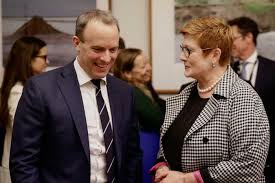Diplomatic tensions over Britain’s decision to allow Chinese telco Huawei into its 5G network have boiled over after confidential discussions with Australia about the policy were leaked.
The ABC can reveal the UK’s High Commissioner has taken the rare step of writing to the heads of two federal parliamentary committees to formally protest the leak of details of sensitive talks involving Britain’s visiting Foreign Secretary.
One of those committees — Parliament’s powerful intelligence and security committee — has now cancelled a planned visit to the United Kingdom amid the quickly escalating dispute between the allies.
MPs and senators were due to meet with Britain’s security agencies and the UK Parliament’s intelligence committee in March and April.
Last week, UK Foreign Secretary Dominic Raab travelled to Canberra on his first international trip since the Brexit process was formally concluded to strengthen trade ties with Australia.
His visit took place just days after Britain became the first of Australia’s “five-eyes” intelligence allies to ignore United States warnings to ban Huawei technology from new high-speed wireless networks.
During his Canberra stopover, Mr Raab discussed his Government’s controversial Huawei decision in private meetings with members of Federal Parliament’s Intelligence and Foreign Affairs Committees.
According to a report that later appeared in the Sydney Morning Herald, Labor MP and Deputy Intelligence Committee chair Anthony Byrne strongly criticised Mr Raab in the confidential discussions.
“How would you feel if the Russians laid down infrastructure in your own networks? That’s how we feel about Huawei,” Mr Byrne reportedly said to the visiting British Minister.
The only other participants in the closed-door meeting were UK High Commissioner Vicki Treadell, the chair of Parliament’s Intelligence Committee and Liberal MP Andrew Hastie, and Liberal senator David Fawcett, who chairs the Foreign Affairs Committee.
The ABC has confirmed Ms Treadell wrote to Mr Hastie and Senator Fawcett to formally register Britain’s disapproval that details of the private talks were leaked.
Both men declined to comment, as did Mr Byrne, but the ABC has been told the High Commissioner’s correspondence was “measured” and “stern”.
One committee member described the High Commissioner’s intervention as “a big mistake” and “foolish”. The British High Commission declined to even confirm letters had been sent, telling the ABC it was “unable to provide comment on private briefings, or on any information pertaining to be from these private briefings”.
While the British and Australian governments have declined to comment on last week’s private meeting, Mr Bryne did note the talks in a Twitter post saying it was “great” to meet the British Foreign Secretary.
“We had a full and frank discussion regarding 5G, trade and strategic challenges,” the Deputy Intelligence Committee chair wrote.
Foreign Minister Marise Payne has declined to comment about the British High Commission’s formal complaint about the leaked Huawei discussions.
Treasurer Josh Frydenberg downplayed the rift, saying ties between the nations had “never been stronger”.
“I’m not going to add to the commentary on that matter other than to say our relationship with the United Kingdom couldn’t be stronger,” he said.
Following his talks with Senator Payne last week, Mr Raab assured Australia that Britain’s decision on Huawei would have no impact on its ability to share sensitive information with its ally.

